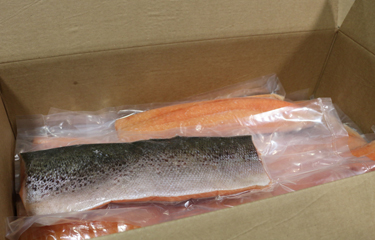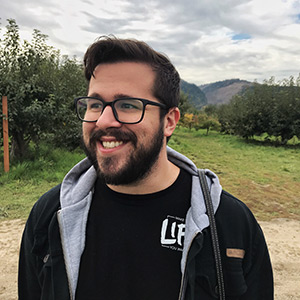Samuels & Sons announces plan to sell AquaBounty GE salmon

Samuels & Sons, one of the largest seafood wholesalers in the United States, will be one of the first companies to buy and sell AquaBounty’s genetically engineered AquAdvantage salmon.
The Philadelphia, Pennsylvania, U.S.A.-based wholesale restaurant supplier is giving the RAS-raised GE salmon a shot, despite the product facing boycotts from major foodservice companies in the U.S. like Aramark and Sodexo and vocal opposition from environmental advocacy groups opposed to aquaculture and genetic engineering.
“As a company, we’ve always liked to be at the front of the line. We’ve been following AquaBounty for a long time as they’ve developed this product and it’s nice to see it to finally come to fruition,” Joe Lasprogata, the director of purchasing at Samuels & Sons, told SeafoodSource. “We’ve been doing this for a long time and have seen a lot of new products come to market. Some of them make it and some of them don’t. But we’re willing to give it a shot and share this with our customers, who ultimately decide whether a product is a success or not.”
In late February, AquaBounty shipped samples of AquAdvantage salmon to a lineup of potential purchasers for final quality tests and feedback, including Samuels & Sons.
“It tastes like salmon!” Lasprogata said. “It’d be pretty silly to go through all this and have something that didn’t taste right. The surprising thing was that there weren't any surprises, you know? I think they got it right. Now it’s just a matter of convincing the American public that this may be the future of farm-raised seafood.”
Lasprogata said he is a big supporter of the aquaculture industry and views it as the future of the seafood industry, estimating that about 60 percent of Samuels & Sons’ products come from aquaculture, with its Atlantic salmon products coming from between 12 to 20 producers (along with a few king salmon operations).
“It's a more efficient way to raise salmon and relieve some of the stress on the natural stocks of fish,” he said.
Lasprogata said aquaculture operations including AquaBounty’s provide benefits such as a lower carbon footprint for the industry without substantial transportation costs. AquAdvantage salmon also process feed more efficiently, he said.
“There are a lot of benefits to aquaculture and what AquaBounty specifically is doing. We want to make sure our customers have the correct information while making seafood choices and aren’t misled,” he said.
AquaBounty had originally planned for its first harvest to commence in December, but it pushed back the harvest period to late March or early April due to the COVID-19 pandemic. The company reported a net loss of USD 16.4 million (EUR 13.8 million) in 2020 and a fourth quarter net loss of USD 6.1 million (EUR 5.1 million), but company executives said they remain optimistic AquAdvantage salmon will do well once it hits the market.
“2020 was a decisive year for AquaBounty, and we believe we have positioned the company for an even more pivotal 2021. With our fortified balance sheet, the impending first-ever commercial harvest of AquAdvantage salmon, and the planned construction of our next farm, we look forward to sharing our upcoming milestone achievements with our valued shareholders,” AquaBounty President and CEO Sylvia Wulf said.
Photo courtesy of AquaBounty






Share